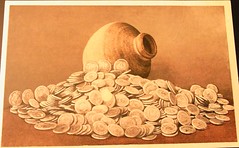
PREV ARTICLE
NEXT ARTICLE
FULL ISSUE
PREV FULL ISSUE
STILL MORE ON THE WASHINGTON'S HEADQUARTERS COIN HOARD
John Kleeberg submitted these notes on the coin hoard discussed in recent issues. Thanks!
-Editor
As listed in the entry, the contents are 652 silver coins, 1 gold medal. The silver coins are 8 reales, dating from 1621 through 1773, and a French écu, dated 1734. There was a gold medal “struck in honor of some Spaniard, dated 1654.” It was found on the estate of Thomas Ellison by Silas Corwin. The mansion is said to have once been the headquarters of General Washington. The jar was found four feet below the surface. Its open end was downward, and it rested on a flat stone. The Corwin family sold most of the coins for large prices, but retained some as curiosities. Some are supposed to have gone to the State Museum of Newburgh, New York. One coin went to Dr. Goodrich, the State Treasurer of Connecticut, according to the Hartford Times. The citations I give are an article by Reginald Pelham Bolton in the Quarterly Journal of the New York Historical Society (January 1931), pp. 112, 117 (if I remember rightly this is just a reproduction of the postcard); Sydney Phillip Noe, The Castine Deposit (1942) p. 34; Walter Breen, "Survey of American Coin Hoards", The Numismatist, January 1952, p. 9 (Hoard number III); I. D. Brown and Michael Dolley, A Bibliography of Coin Hoards of Great Britain and Ireland, 1500-1967 (1971) p. 59 (Hoard number NT1)(just a short listing), and two mentions in the American Journal of Numismatics: vol. 18, no. 4, p. 79, and vol. 20, no. 4, p. 92. There are some contradictions here with the subsequent information: Was the hoard found by Silas Corwin or by Samuel Pink? The last two digits of the date of oldest coin were transposed in one account, so is the date 1612 or 1621? 1612 or 1621 would be a cob, not a pillar dollar, which is interesting. If the deposition occurred in connection with the headquarters of Washington/Knox, then 1782 might be a more probable date of deposit. But if 1782, why no Carolus bust dollars? Was the hoard put together by someone picking out the pillar dollars (917 fine) at a time when the Carolus bust dollars (903 fine) first began to circulate? It would be good if photographs of the obverses and reverses and weights of the approximately 32 coins that are in the State Museum could be published; just knowing the dates and mintmarks would be useful. It would also be helpful to have good photographs of the jar (if it, too, has survived), to compare it to a reference work such as Kathleen Deagan, Artifacts of the Spanish Colonies and the Caribbean, 1500-1800, vol. 1: Ceramics, Glassware, and Beads (1987).
Thanks also to Tom Kays and everyone who contributed on this topic. A very interesting and important find!
-Editor
To read the earlier E-Sylum article, see: MORE ON THE WASHINGTON'S HEADQUARTERS COIN HOARD (www.coinbooks.org/esylum_v16n52a13.html)

Wayne Homren, Editor The Numismatic Bibliomania Society is a non-profit organization promoting numismatic literature. See our web site at coinbooks.org. To submit items for publication in The E-Sylum, write to the Editor at this address: whomren@gmail.com To subscribe go to: https://my.binhost.com/lists/listinfo/esylum All Rights Reserved. NBS Home Page Contact the NBS webmaster 
|
